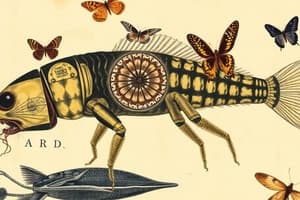Podcast
Questions and Answers
Invertebrates play a crucial role in ______ cycling, particularly through decomposition and sediment disturbance.
Invertebrates play a crucial role in ______ cycling, particularly through decomposition and sediment disturbance.
nutrient
Some invertebrates, such as ______, are important for habitat formation, creating structures like coral reefs and shell shelters.
Some invertebrates, such as ______, are important for habitat formation, creating structures like coral reefs and shell shelters.
corals
Invertebrates act as ______ , providing valuable insights into the health of the environment.
Invertebrates act as ______ , providing valuable insights into the health of the environment.
bioindicators
______ are a key factor in invertebrate responses to environmental changes, allowing them to adapt their behavior to avoid stress.
______ are a key factor in invertebrate responses to environmental changes, allowing them to adapt their behavior to avoid stress.
Signup and view all the answers
The economic importance of invertebrates is evident in their use for various products and services, such as the use of ______ in the production of Hirudin, a blood-clotting inhibitor.
The economic importance of invertebrates is evident in their use for various products and services, such as the use of ______ in the production of Hirudin, a blood-clotting inhibitor.
Signup and view all the answers
Study Notes
Importance of Invertebrates
- Invertebrates play a crucial role in the environment
Ecological Importance
- Nutrient Cycling: Decomposition and sediment disturbance are key processes.
- Habitat Formation: Invertebrates create habitats (e.g., corals form coral reefs, mollusks provide shell shelter). These shelters provide refuge for smaller organisms.
- Biodiversity: Invertebrates are essential components of food webs, influencing primary consumers.
- Bioindicators: Invertebrates can be used to monitor the health of an environment by accumulating sensitivity to environmental changes. These organisms are sensitive to specific pollutants and changes.
Bioindicators
- Accumulate sensitivity to environmental changes.
- Sensitive to specific pollutants and changes (e.g., mussels accumulate heavy metals).
- Wide range of bioindicators allows for monitoring across different ecosystems (e.g., bivalves).
- Rapid life cycle (e.g., nematodes) allows for quick responses to environmental changes.
- Immobile/sessile (e.g., mollusks, bivalves) ensures their responses are specific to the environment.
- Easy to sample and identify (e.g., earthworms) due to abundance and characteristics.
Factors Contributing to Tolerance
- Behavioral Adaptation: Organisms adapt their behavior to cope with environmental changes (e.g., migration).
- Physiological Responses: Internal systems of organisms determine their tolerance limit to environmental changes (e.g., copepods cannot survive if DO levels fluctuate).
- Feeding Habits: Diverse feeding strategies affect sensitivity to environmental changes in food availability (e.g., earthworms rely on organic matter).
Economic Importance
- Fisheries/Aquaculture: Organisms like crabs, lobsters, mollusks, copepods polychaetes are used in fisheries and aquaculture. These organisms providing food for other animals in the aquaculture environment.
- Other Uses: Leeches (hirudin) are used to prevent blood clotting, and other invertebrates provide antioxidants and cosmetics.
Studying That Suits You
Use AI to generate personalized quizzes and flashcards to suit your learning preferences.
Description
Explore the vital role of invertebrates in ecosystems. This quiz covers their contributions to nutrient cycling, habitat formation, biodiversity, and their use as bioindicators for environmental health. Test your understanding of how these organisms shape and influence their environments.




